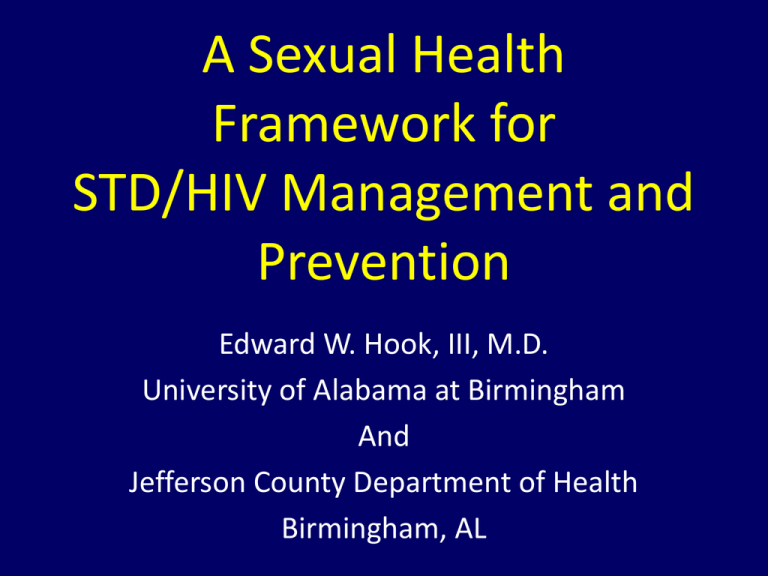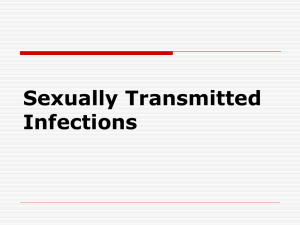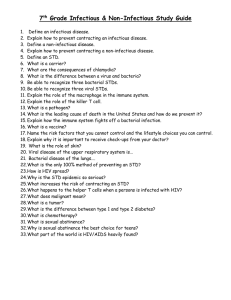
A Sexual Health
Framework for
STD/HIV Management and
Prevention
Edward W. Hook, III, M.D.
University of Alabama at Birmingham
And
Jefferson County Department of Health
Birmingham, AL
Edward W. Hook, III, M.D.
Grant/Research Support:
NIH, CDC, WHO,
GlaxoSmithKline, Becton
Dickinson, Cepheid, GenProbe, Roche Molecular,
Cempra
Consultant:
MedHelp.org
Speakers Bureau:
None
U.S. STD Control in the 21rst Century:
A Challenge and an Opportunity
• Flat or increasing STD Rates
• HIV as an STD
• Opportunities
– Using new tools
– Low hanging fruit- improvement of clinical
services
New Tools For STD Prevention and Management
• Nucleic Acid Amplification Tests
- Extra genital testing
• HPV Vaccine
• Type-Specific Tests for HSV
• Suppressive Antiviral Therapy for Prevention
of HSV-2 Transmission
• Partner Delivered Therapy
• Circumcision For HIV Prevention
Gonorrhea—Rates, United States, 1941–2011
2011-Fig 16. SR
Syphilis—Reported Cases by Stage of
Infection, United States, 1941–2011
2011-Fig 36. SR
Chlamydia—Rates by Sex, United States,
1991–2011
NOTE: As of January 2000, all 50 states and the District of Columbia have regulations that require the reporting of chlamydia
cases.
2011-Fig 1. SR
Chlamydia Screening, Sexually Active U.S.
Women Enrolled in Health Plans, 2007
Goal: Screen all sexually active women < 25 years of age annually
(Healthcare Effectiveness Data & Information Set (HEDIS)
% 16-25 Sexually Active Screened
Northeast
45.5%
Midwest
38.5%
West
45%
South
37.3%
United
States
41.6%
Medicaid HMO
50.5%
Commercial HMO
39.6%
MMWR 58 ; 362-365: 2009
THE NEXT GREAT PLAGUE TO GO
Thomas Parran’s 5-Point Program For Syphilis Control – 1936
1. Case Finding – Serologic Screening Programs
2. Prompt Therapy
3. Contact Identification, Testing, and Therapy
4. Mandatory Serological Evaluations – Premarital and
Early Pregnancy
5. Public Education = Symptoms, Complications,
Treatment
STD Health Disparities and Stigma:
A Challenge and an Opportunity
• Flat or increasing STD Rates
• Opportunities
– Using new tools
– Low hanging fruit- improvement of clinical
services
• STDs, Stigma and Health Disparities
Historical Partners in U.S.
STD Prevention
American Society for Sanitary and Moral
Prophylaxis (1905) – (Coalition of physicians, social
hygienists, charity groups, moral reformer
churches)
American Social Hygiene Association (1913)
Armed Forces
U.S. Public Health Services
Brandt, AM. No Magic Bullet, Oxford Univ Press, 1985.
Conventional Wisdom
Regarding STDs
STDs are the result of inappropriate behavior
People with STDs will know they have them
Efforts to control STDs should focus on women
Sex (and STDs) is not an appropriate topic for
conversation
Conventional Wisdom Regarding STDs
Gender Roles
Women - Victims or Vixens
Men – Vectors +/or Victims
STDs Don’t Affect “Us” and Are Not Our Concern
Widely Health Beliefs About STDs
“Nice” (normal?) people do not get STDs
If you are not “promiscuous” you will not get STDs, unless
your partner betrays you
Testing for STDs is warranted primarily for persons with
risks for STD
When STDs are present, its obvious
Discussion of the need for STD testing is offensive to
patients
Stigma
Intolerance
Consequences of
STD-Related Stigma
Personal (Individual)
Provider
Population
Consequences of
STD-Related Stigma
Personal (Individual)
– Delays in seeking preventative health care
•
•
•
–
–
Condoms
Vaccines
Screening
Delays in seeking care for perceived problem
Ineffective partner notification
Provider
– Hesitancy in seeking relevant information
– Differential testing
– Changes to provider-client interactions
Population
– Guilt by association
– Differential Care
– Profiling
JCDH STD Clinic - 2007
Visits 14,063
Clients 10,358
Women 4977 (48%)
Sexual Partners Reported by Women, past Year
1 – 54%
2 – 29%
3 – 9%
> 4 – 7%
Women Attending the
JCDH STD Clinic – High Risk?
STD Diagnoses
1 Partner,
Past Year
N = 347
> 4 Partners,
Past Year
N = 347
OR (95% CI)
Trichomoniasis
59 (17%)
61 (18%)
1.03 (0.69 - 1.52)
C. Trachomatis
48 (14%)
74 (21%)
1.67 (1.12 - 2.49)
N. Gonorrhoeae
24 (7%)
42 (12%)
1.83 (1.08 - 3.10)
Syphilis
13 (4%)
33 (10%)
2.61 (1.35 - 5.06)
Van Wagoner N, Harbison H, Jones M, Turnipseed E, Hook EW. Sex Trans Dis 2010; 38: 210-215
Self Report Sexual Partners,
Past Year (%)
All
African
American
0
1
2
3
6.9
68.2
7.6
3.0
7.9
60
11.4
4.2
0
54%
29%
9%
>4
3.8
6.6
7%
*2002 NSFG, National Center for Health Statistics
+Van Wagoner N, Harbison H, Jones M, Turnipseed E, Hook EW. Sex Trans Dis 2010; 38: 210-215
Performance of NAATs for Diagnosis of Pharyngeal N.
Gonorrhoeae Infection
Pharyngeal Gonococcal Infection By Site
Site
No (%) Individuals
Genital and Oral
23 (28%)
Genital Only
28 (34.1%)
Oral Only
31 (37.8%)
Total Genital or Oral
82 (100%)
Bachmann, et al. J Clin Micro. 2009; 47:902-907.
Performance of NAATs for Diagnosis of Rectal N.
Gonorrhoeae Infection
Rectal Gonococcal Infection
% Sensitivity (95% CI)
% Specificity (95% CI)
ProbeTec (SDA)
100% (85.2-100)
96% (93.4-97.8)
Amplicor (PCR)
95.8% (78.9-99.9)
96% (93.4-97.8)
Aptima Combo2 (TMA)
100% (85.2-100)
95.5% (92.7-97.4)
Culture
71.9% (53.3-86.3)
99.7% (98.4-100)
Bachmann, L et al. J. Clin Microbiol. 2010;48(5);1827-1832
Performance of NAATs for Diagnosis of Rectal C.
trachomatis Infection
Chlamydial Rectal or Genital Infections By Site
Site
No (%) Individuals
Genital and Rectal
20 (40.8%)
Genital Only
6 (12.2%)
Rectal Only
23 (46.9%)
Genital or Rectal
49 (100%)
Bachmann, L et al. J. Clin Microbiol. 2010;48(5);1827-1832
Insanity is doing the same thing over
and over again and expecting a
different result.
Albert Einstein
Sexual Health
Sexual health is a broad perspective that spans
the entire lifespan encompassing topics which
include:
Sex Education
Family Planning
STD/HIV Management
Reproductive Track Care
Interpersonal Relationships Erectile Dysfunction
Why Sexual Health?
Health is a human right
Sexual health is a positive message –
something to be sought, not avoided
Sexual health is operational over the entire
life course
Sexual health provides a “big tent”
A sexual health framework shifts the approach from
a more traditional loss frame approach to a gain
frame
Framing – influenced by context; anticipated to
have selective influence on perception,
encouraging certain interpretation,
discouragement, others (Wikipedia)
Gain frame – Emphasizes positives, benefits
Loss frame – Emphasizes risks, potential harm,
potentially fueling shame and stigma
CDC Definition of Sexual Health: A Public
Health Perspective
• Sexual health is a state of wellbeing in relation to sexuality across
the lifespan that involves physical, emotional, mental, social, and
spiritual dimensions.
• Sexual health is an inextricable element of human health and is
based on a positive, equitable, and respectful approach to sexuality,
relationships, and reproduction, that is free of coercion, fear,
discrimination, stigma, shame, and violence.
• It includes the ability to understand the benefits, risks, and
responsibilities of sexual behavior; the prevention of disease and
other adverse outcomes; and the possibility of fulfilling sexual
relationships.
• Sexual health is impacted by socioeconomic and cultural contexts–
including policies, practices, and services–that support healthy
outcomes for individuals and their communities.
Developed by the Sexual Health Workgroup of the CDC-HRSA Advisory Committee. 2011
Sexual Health Models for STD/HIV
Prevention
Disease Model
Sexual Health Model
Disease – To be avoided
Health = basic human right
STD/HIV
Sexual Health – Component of health
– Consequence of socially
unacceptable behavior
– Embarrassment
– Stigmatizing
Control Requires:
Testing
Treatment
Partner notification
STDs – threats to sexual health
acquired in the course of sexual
activity
Health Preservation Through
- Education
- Vaccination
- Testing (Screening)
- Treatment
- Communication between partners
Sexual Health Framework:
Using health promotion to complement disease
control and prevention





